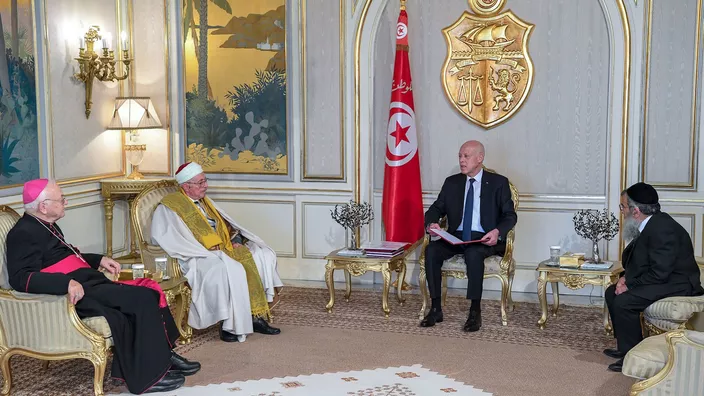– They accuse the authorities of trying to “restrict the freedom of the press” and denounce the arrest of a director of a private local radio station, as part of the recent wave of arrests
Dozens of Tunisian journalists demonstrated on Thursday to defend press freedom and denounce the “muzzling of the media”, a few days after the arrest of a director of a local private radio station very listened to in Tunisia, within the framework of a wave of arrests affecting several personalities.
At the call of the National Union of Tunisian Journalists (Snjt), the demonstrators gathered at “Place de la Kasbah” near the headquarters of the government presidency in Tunis, according to Anadolu’s correspondent on the spot.
“Free media, independent press”, “We are journalists, not terrorists”, “No to repression against journalists”, chanted the demonstrators among other slogans.
The protesters also waved banners that read: “No to the restriction of press freedom”, “No to the muzzling of the media”.
“We are extremely mobilized to defend the freedom of the press and of expression, as well as the right of the Tunisian people to information”, declared the president of the Snjt, Mahdi Jlassi, during this protest rally.
And Jlassi added: “We demand the sustainability and independence of media establishments. We will continue to defend this cause and we say it bluntly: the arrest of the boss of the private radio station “Mosaique FM”, Noureddine Boutar, is linked to the objective and independent content of the programs broadcast by this media”.
“The authorities are disturbed by the content of independent media programs. They want bland media, which will sugarcoat their failure to try to get hold of information and the press”, added the president of Snjt.
Since Saturday February 11, the Tunisian authorities have been carrying out a wave of arrests of well-known personalities, including party leaders, two magistrates, an influential businessman, a lawyer and a political activist.
On Tuesday, the President of the Republic Kais Saied accused some of the defendants of being involved in a plot against state security, holding them responsible for the shortage of basic products and the soaring prices.
Jlassi accused those in power of wanting to intimidate journalists. “Laws and threats do not scare us, and arrests cannot deter us from defending all our colleagues”, insisted the president of the Snjt.
On many occasions Saïed had expressed his attachment to the freedom of the press and of expression, conditioning this beforehand on the “freedom of thought” which would preserve the State and its institutions.
He has also insisted on more than one occasion on the independence of the judiciary, but the opposition accuses him of instrumentalizing justice to track down those who reject the exceptional measures he declared on July 25, 2021. .
Tunisian political parties consider Saïed’s emergency measures to be a “coup d’etat against the 2014 Constitution and a consecration of autocratic power”, while other political parties consider it a “restoration” of the revolutionary process of 2011, which had brought down the power of former President Zine El Abidine Ben Ali (1987-2011).
Saïed, who began a five-year presidential term in 2019, said his decisions on emergency measures were taken within the framework of the Constitution to protect the state “from imminent danger”, putting the emphasis on the preservation of rights and freedoms.














